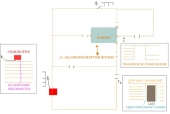posted 11 years ago
The usual reason for a fence not charging at all or having a low charge is grounding..... You would be surprised how important this is. I've fought grounding issues and 9 times out of 10 that is the solution.
Three ground rods, buried 3ft each....hmmm..... I bet the book on your charger suggests something more akin to 4 to 6 rods each driven 8ft in the ground..... And it looks like your connection to the ground rod is pretty weak. It also looks like your ground rod is some sort of aluminum pole..... Trust me, it's worth going to Home Depot or and electrical supply somewhere and buying 3 or 4--or the recommended amount--of steel coated copper ground rods and driving them in as deep as possible, or laying them in a ditch all around 10ft apart, using proper cable to rod clamps.
I got a phone call the other day to come shoot some cattle which were out roaming a neighborhood because the owner was away on a trip and the cattle kept breaking out of a very poor electric fence and were destroying property....not a great recipe for farming for anyone.
I know this sounds like a pain, especially of your rotationally grazing.....Another thing just popped into my head..... Your using wire. There can be an impedance mis-match. In other words, certain chargers need certain kinds of wire. Poly-wire, which is what I use because its reliable, fast and easy to wind and move around and lasts and can be repaired on the fly, requires a certain kind of pulse. If the charger can't deliver that then it can melt the polywire or just not work. I don't know if the same is true for aluminum, etc. I have also only ever built and used Hi-tensile wires for perimeter fencing, which, again, I made sure the charger could handle the load.
How many strands of wire are you charging? The connections are critical. Voltage is lost at each mend, or connection. And each strand of wire is counted...so my 2 miles of 5 strand perimeter fencing is really 10 miles of wire, plus around another mile of temporary paddock dividing, etc. Also, making sure the ground is wet helps. I had a heck of a time with a herd of cattle and a solar charger because it was too dry for the grounding rods...
Finally.....I know budgets are tight. but $70 is awfully cheap for a charger. I don't even recognize the brand and I've used many. My reliable go-to chargers are either Gallagher or Speedrite. I've also used an Intelishock portable to run pigs, but it didn't last nearly as long as the cheaper, less zappy Gallagehr S-10 solar.
The other thing to consider with chargers isn't how many miles it's rated for.....lots of things can affect that....it's how big a punch it delivers. For cattle--especially Highlands like I like to run--require something quite hot, like around 9 joules, so that if the voltage dips or it's rainy and grass is against the fence it still delivers a zap. Jerseys require less, because their more docile. Sheep require something quite hot too because they can be numb and have wool on their heads. Pigs only need it to be hot once, usually.....
I'm currently running my horses with just an uncharged strand of poly-wire. As long as there is grass, they're not going to test it.
You did good getting the Speedrite Fault Finder...they're great. I really miss having my Speedrite charger and fault finder which could turn the fence off anywhere along the line...... Another things worth considering is getting a Scythe and trim your fence lines. A few minutes spent clearing the perimeter can really help take the load off the charger and then a single high strand to cross fence works very well.
Hope this helps, some.....





































 I don't know
I don't know 
 2
2







